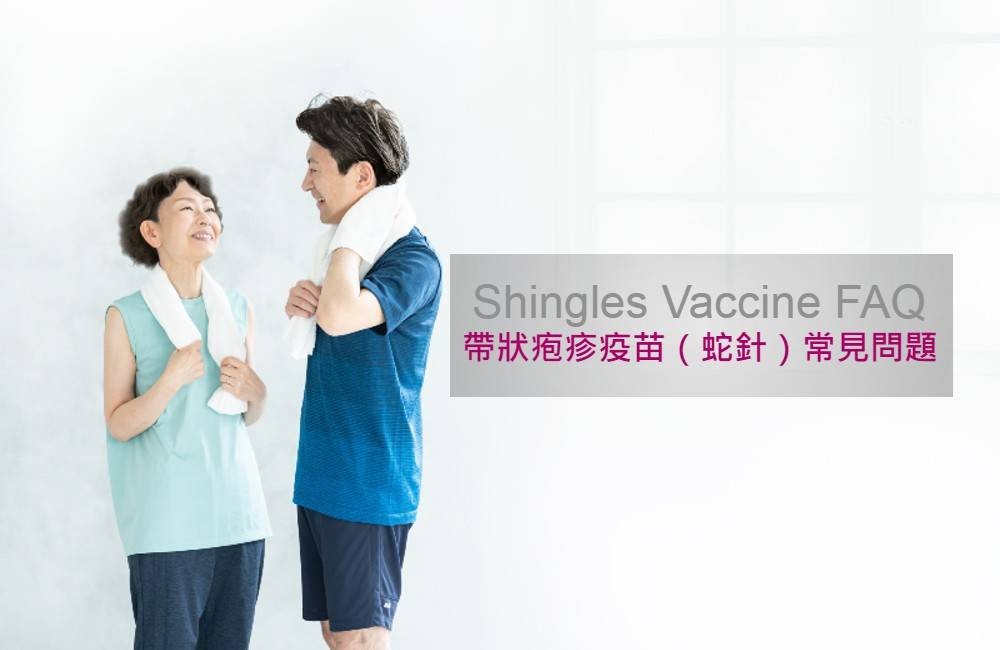
Shingles Vaccine FAQ
Shingles, also known as herpes zoster, is a viral infection that causes a rash which often appears as a band of blisters that wraps around the body.
- Who is at risk of developing shingles?
Shingles is caused by the varicella-zoster virus (the same virus that causes chickenpox). After we recover from chickenpox, the virus remains dormant in our nervous system and is generally suppressed by the immune system. However, if our immunity is lowered at some point in the future, the virus may reactivate. Risk factors of shingles include:
- Being older than 50
- Chronic illness (such as diabetes, cardiovascular disease, kidney disease, etc.)
- Long-term use of steroids
- Being under psychological stress; lack of regular rest
- What are the symptoms of shingles?
- Initial symptoms are not apparent and may include headache, fatigue, fever, and gastrointestinal discomfort. Generally, within 24 to 72 hours of onset, patients will experience pain, numbness, and a burning sensation near the infected nerves, though the severity of pain varies from person to person. A rash or blisters will then develop on the skin, gradually forming a stripe that wraps around the body. The fluid-filled blisters may last from one to 14 days, and break open and crust over two to three weeks.
- The shingles rash usually develops on the back or the side of the torso. However, if it develops on the face, it may affect vision or hearing.
- After recovery, some patients experience complications, such as pain that continues for months or years.
- What are the benefits of the shingles vaccine? Does it prevent chickenpox?
The shingles vaccine does not prevent chickenpox, but helps:
- Prevent shingles and lower the risk of recurrence
- Lower severity of the condition and symptoms
- Reduce risk of complications (such as postherpetic neuralgia)
- Does the shingles vaccine help treat shingles?
- The shingles vaccine is only effective in preventing the condition. In the event you develop shingles, seek medical help as early as possible. Your doctor will generally prescribe antiviral drugs to promote recovery.
- How is the shingles vaccine administered? How many doses are required?
- The vaccine is administered intramuscularly and patients should receive two doses to ensure maximum protection from the virus. The second dose should be administered within 2 to 6 months after the first dose.
- How long does the protection from a shingles vaccine last?
- Studies show that the shingles vaccine offers protection for at least four years after receiving the second dose. The vaccine is 90% effective in preventing shingles. Research is still being conducted on the strength of protection after four years.
- Who should receive the shingles vaccine?
Shingrix is indicated for prevention of herpes zoster (HZ) and post-herpetic neuralgia (PHN), in:
- adults 50 years of age or older;
- adults 18 years of age or older at increased risk of HZ
The use of Shingrix should be in accordance with official recommendations.
- What are the side effects of the shingles vaccine?
Common side effects include:
- Pain, redness, or swelling at the injection site
Other side effects include:
- Headache
- Abdominal pain and discomfort
- Muscle pain
- Fatigue
- Chills, fever
If you experience severe side effects, such as difficulty breathing or a fast heartbeat, consult a doctor immediately.
- Can the shingles vaccine be taken alongside other vaccines?
The shingles vaccine may be administered alongside other vaccines within the same day, including the pneumococcal vaccine and influenza vaccine.
- Who should not receive the shingles vaccine?
- Those who are allergic to the active ingredients or any component of the vaccine
- Women who are or plan to become pregnant
- Breastfeeding women

















